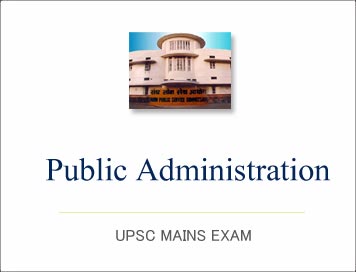(Exam Paper) UPSC IAS Mains 2006: Public Administration
(Exam Paper) UPSC IAS Mains 2006: Public Administration
Paper- I
Section A
1. Answer any three of the following in not more than 200 words each:
(a) “If public administration is to play a major legitimising role in
governing our complex society, it needs to be more fully conceptualised.”
Discuss.
(b) “Simon’s work has had major implications for the study of public
administration and the practice of public administration professionalism.”
Comment.
(c) “The main problem with Mary Parker Follett’s work is that her idealism is
showing” Explain.
(d) “Autonomy and accountability in Public Enterprises cannot walk together”.
Explain.
2. Critically examine the Classical Science of Administration with special reference to its criticism by Dwight Waldo and Robert Dahl.
3. Define the term ‘civil society’. How does civil society influence the public policy ?
4. “Today the content of administrative law is driven primarily by the scope of public administrative activity.” Explain.
Section B
5. Answer any three of the following questions in not more than 200 words
each:
(a) “The rise of information technology is an opportunity to overcome
historical disabilities”. Explain.
(b) “Audit continues to be considered as something alien, something extraneous
and something of the nature of an impediment.” Explain.
(c) “Nothing comes across more strongly than the great naivete about policy
implementation.” Discuss.
(d) “Successfully implementing budgeting approach _ requires favourable
incentive structures.” Discuss.
6. Do you agree with the view that development administration has in recent years lost its impetus without making any significant intellectual breakthrough ? Discuss.
7. To what extent has the human relations movement contributed to the knowledge and practice within the field of personnel administration ?
8. Discuss the main approaches to increase the efficiency of government and public administration.
Paper - II
Section A
1. Comment on any three of the following in not more than
200 words each:
(a) “In the happiness of his subjects lies the king’s happiness; in their
welfare his welfare.” Comment on Kautilyan state administration. In what
respects is modern democratic rulers’ behaviour different from Kautilyan rulers
?
(b) “The basic values of the Constitution of India enshrine social, political
and economic philosophy symbolising sovereignty of the people, rule of law and
basic characteristics of a socialist, secular, democratic, republic.” Comment.
(c) “The 73rd and 74th Constitutional Amendments are major landmarks in India’s
Constitutional History and Local Governance.” Comment.
(d) “Not the Potomac, but the Thames, fertilizes the flow of Yamuna”. In the
light of the statement comment on the symbolic institution of the President of
India.
2. “The role played by the National Human Rights Commission in maintaining and preserving dignity of India’s citizen has been satisfactory and up to the expectations.” Elucidate.
3. Indian Prime Minister should not only be
accountable to the Indian Parliament but should appear to be so.”
Comment on the accountability of the Prime Minister to the Indian Parliament in
the context of extra-constitutional power.
4. “The District Collector, the Additional Deputy Commissioner and Sub-Divisional Officer, have virtually become ‘officers-in-attendance’ and have lost initiative and independent of judgement.” Comment.
Section B
5. Comment on any three of the following in not more than
200 words each:
(a) “The generalist character of I.A.S. is its chief characteristic as well
as its chief criticism.” Comment.
(b) “All efforts in the field of reforms in public administration by the
political executive have resulted in no significant output.” Comment.
(c) “By taking some offices out of the jurisdiction of the Office of Profit Act,
the Government of India has doubly assured the public mind of its duplicity.”
(d) “Audit, like the judiciary, the executive and the legislature is one of the
important ingredients of democracy.” Comment.
6. “The main problem of Centre-State relations in India is bottlenecks in fiscal federalism.” Comment.
7. “Lok-Ayuktas are judicial institutions without adequate teeth”. Comment.
8. (a) Critically evaluate the policies of the Union
Government with regard to the welfare of women and children of India in not more
than 200 words.
(b) What measures have been taken by the Union and the States for the welfare of
women in the profession of sex ?
(c) What concrete steps have been taken by the Union and the State Governments
to protect child labour and prevent abuse of children ?


